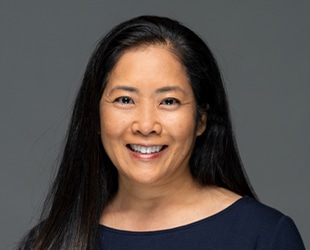Crossing the Bridge over the Valley of Death with an AACR-Bayer Innovation and Discovery Grant
The AACR-Bayer Innovation and Discovery Grants were established to provide new treatment options for cancers with high unmet medical need, encourage innovation and translation of ideas from basic research into novel drugs, and foster collaborations between academic groups and the pharmaceutical industry.

Rosa Hwang, MD, received the AACR-Bayer Innovation and Discovery grant in 2016, supporting her research on a new therapeutic target in pancreatic cancer, Dickkopf 3 (DKK3). In preliminary studies, Dr. Hwang and her group found that pancreatic cancer-associated fibroblasts (pancreatic stellate cells) secreted DKK3, which subsequently promoted tumor progression, metastasis, and resistance to chemotherapy. Although neutralization of DKK3 using genetic knockout approaches resulted in inhibition of tumor growth and improved survival, it was unclear whether treatment with a novel DKK3-targeted blocking antibody would be an effective therapeutic to enhance response to chemotherapy and immunotherapy.
Dr. Hwang was an Associate Professor of Surgical Oncology at the University of Texas MD Anderson Cancer Center. Now a Professor, Dr. Hwang shares how this unique grant mechanism helped in the development of another weapon in the arsenal against this deadly disease.
What motivated you to pursue pancreatic cancer as a focus of your research?
Pancreatic cancer has the worst prognosis of all solid tumors, and treatment options are very limited. If we are to make any significant progress in improving the outcome of patients with pancreatic cancer, we need to better understand the biology of the disease and develop more effective, targeted drugs.
As a surgical oncologist, what led you to apply for the AACR-Bayer Innovation and Discovery Grant?
We had identified DKK3, produced in the tumor microenvironment, as a new target in pancreatic cancer. We obtained promising preliminary results with genetic approaches to neutralize DKK3 in preclinical models of pancreatic cancer. Consequently, we generated a therapeutic DKK3-blocking monoclonal antibody. We were interested in testing this antibody for its efficacy as a novel treatment for pancreatic cancer, either alone or in combination, with chemotherapy or immunotherapy. I thought our project would be a perfect fit for the AACR-Bayer Innovation and Discovery Grant, which was aimed at supporting translational research such as ours.
How important to you, at that stage of your career, was the award? Did it allow you to do things you might not otherwise have done?
This award was very helpful to our research since there aren’t many opportunities to support translational research at an early stage. It allowed us to further validate the efficacy of our therapeutic blocking antibody in mouse models of pancreatic cancer.
What has been the impact of your AACR-Bayer Innovation and Discovery Grant on your career?
This award was instrumental in helping us generate the foundational data that led to additional funding, including an NCI/GI SPORE Developmental Research Project Grant and a DOD (Dept. of Defense) Breakthrough Award. We have now secured a patent for our therapeutic antibodies and are moving towards commercialization and hopefully, a phase I first-in-human clinical trial in the near future.
How have the findings from your AACR-Bayer Innovation and Discovery Grant impacted your research and the field of pancreatic cancer research?
Our therapeutic stroma-targeted antibody showed very exciting results in aggressive mouse models of pancreatic cancer, with no obvious toxicity. This could represent a novel treatment strategy for this very challenging disease.
The AACR-Bayer Innovation and Discovery Grant is a grant mechanism focused on examining important and druggable novel targets and/or biomarkers. What do you think are the benefits of such a grant mechanism? How can the impact of such a grant mechanism be increased/amplified?
This grant mechanism was very helpful to me since it can be challenging to identify funding sources for early translational work (the “valley of death”). Successfully moving a discovery from the lab to the clinic requires a lot of funding. The AACR-Bayer Innovation and Discovery Grant was very valuable in helping to bridge the “valley of death.”
The grant’s impact could be amplified by providing resources for grantees to learn more about how to advance their translational research. Most scientists probably have limited knowledge of what is needed for drug development to bring their discoveries from the lab to patients. Topics that may be helpful include intellectual property, licensing, and additional sources of funding for drug development.
Since its inception, the AACR grants program has contributed to the development of new and improved approaches to cancer diagnosis, treatment, and cure. What is your vision for the future of pancreatic cancer research? What areas of pancreatic cancer research need more funding?
Much of cancer research has been focused on cancer cells. More recently, there has been increasing attention on the role of the tumor microenvironment (especially the immune component) in cancer progression. Unfortunately, pancreatic cancer is not responsive to immunotherapies such as immune checkpoint inhibitors. To address this, it is imperative to better understand the mechanisms of resistance, particularly the contribution of the tumor microenvironment.